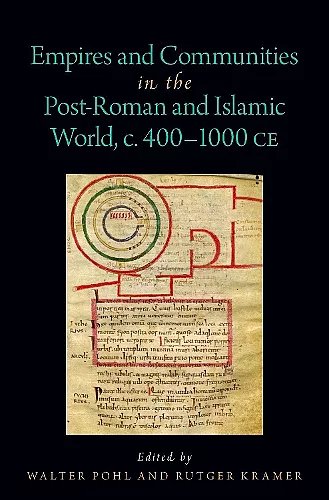Empires and Communities in the Post-Roman and Islamic World, C. 400-1000 CE
Rutger Kramer editor Walter Pohl editor
Format:Hardback
Publisher:Oxford University Press Inc
Published:17th Sep '21
Currently unavailable, and unfortunately no date known when it will be back

This is an open access title available under the terms of a CC BY-NC 4.0 International licence. It is free to read at Oxford Scholarship Online and offered as a free PDF download from OUP and selected open access locations. This book deals with the ways empires affect smaller communities like ethnic groups, religious communities and local or peripheral populations. It raises the question how these different types of community were integrated into larger imperial edifices, and in which contexts the dialectic between empires and particular communities caused disruption. How did religious discourses or practices reinforce (or subvert) imperial pretenses? How were constructions of identity affected in the process? How were Egyptians accommodated under Islamic rule, Yemenis included in an Arab identity, Aquitanians integrated in the Carolingian empire, Jews in the Fatimid Caliphate? Why did the dissolution of Western Rome and the Abbasid Caliphate lead to different types of polities in their wake? How was the Byzantine Empire preserved in the 7th century; how did the Franks construct theirs in the 9th? How did single events in early medieval Rome and Constantinople promote social integration in both a local and a broader framework? Focusing on the post-Roman Mediterranean, this book deals with these questions from a comparative perspective. It takes into account political structures in the Latin West, in Byzantium and in the early Islamic world, and does so in a period that is exceptionally well suited to study the various expansive and erosive dynamics of empires, as well as their interaction with smaller communities. By never adhering to a single overall model, and avoiding Western notions of empire, this volume combines individual approaches with collaborative perspectives. Taken together, these chapters constitute a major contribution to the advancement of comparative studies on pre-modern empires.
Walter Pohl and Rutger Kramer have assembled ten rich contributions with the ambition of participating in a global history spanning Antiquity and the Middle Ages, extending from the Atlantic to the Zagros....The abundance of ideas, innovative approaches, and historical data will undoubtedly offer ample material for reflection for historians of Late Antiquity and the early Middle Ages....In substance, both editors and contributors primarily interrogate the articulation of ethnic, confessional, and regional communities with the Empire to which they belong, and often outlast, as well as the ideological mechanisms of identification underpinning them. * Simon Pierre, BCAI 38 *
The study of empire-community dynamics and howidentities were forged in between helps to provide a better understanding of how empires evolved. The essays in this book guide the reader to understand how this process manifested in western Eurasia for over half a millennium. * Ioannis Papadopoulos, Speculum *
ISBN: 9780190067946
Dimensions: 160mm x 239mm x 33mm
Weight: 748g
464 pages